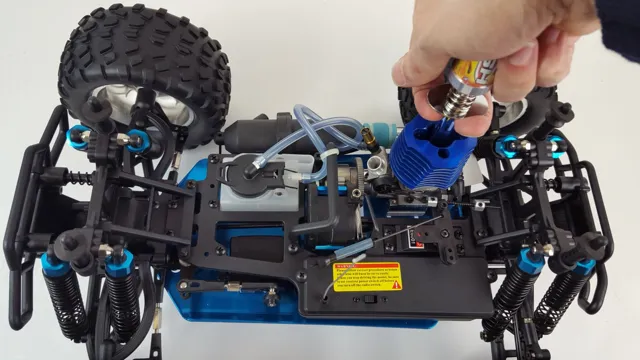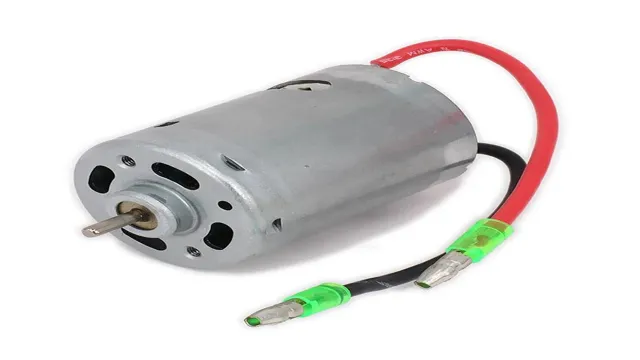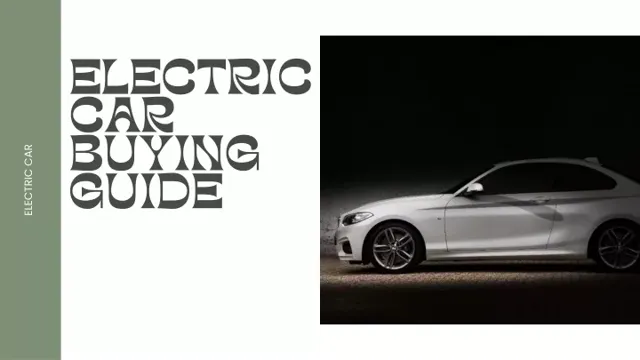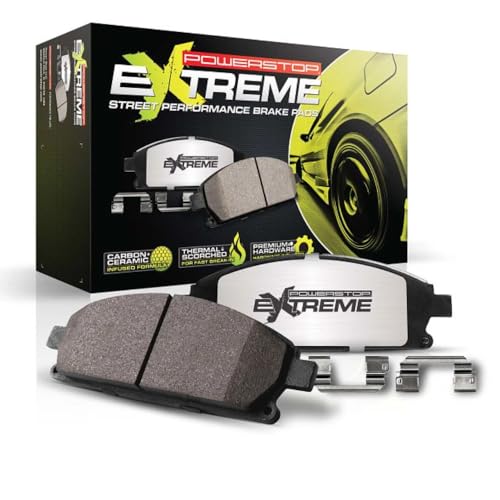Maximize Your RC Car’s Performance with our Ultimate Guide to Electric Motors
Welcome to the ultimate guide on RC car electric motors! If you’re a beginner searching for the best motors for your remote-controlled car or an RC enthusiast looking to upgrade your ride, you’ve come to the right place. In this comprehensive guide, we will cover everything you need to know about RC car electric motors, including the different types of motors, their features, and how to choose the perfect one for your car. Electric motors are the driving force behind your RC car, and choosing the right one can make all the difference in performance.
Whether you’re looking for speed, power, or efficiency, there’s a motor out there that suits your needs. However, with so many options on the market, it can be overwhelming to choose the right one. That’s where this guide comes in.
We’ll be discussing the various types of electric motors available, including brushed, brushless, and coreless motors, and what sets them apart from one another. We’ll also delve into the different features of each motor type and what to look for when selecting one for your car. We’ll also address some common questions and concerns about electric motors, such as how to properly maintain them, how to ensure compatibility with your car, and how to troubleshoot any issues you may encounter.
So sit back, relax, and get ready to learn everything you need to know to become an RC car electric motor expert.
Why Choose Electric Motors?
If you’re looking to upgrade your RC car’s performance, then an electric motor is a great choice. One of the main advantages of electric motors is that they are quieter and cleaner than gas-powered motors. They also offer instant torque, which means they have better acceleration and are more responsive than gas-powered motors.
Additionally, electric motors are easier to maintain and require less frequent tune-ups. When it comes to choosing the right electric motor for your RC car, there are many factors to consider such as the size and weight of the car, the type of terrain you’ll be driving on, and your personal driving style. With the right electric motor, you can take your RC car to the next level of performance and enjoyment.
So, if you’re ready to upgrade your ride, consider an electric motor and get ready to experience the power and speed you’ve been dreaming of.
Efficiency and Power Benefits
Electric motors are an excellent choice for those seeking efficiency and power benefits. Unlike combustion engines that rely on burning fuel, electric motors use electrical energy from a battery or power source to produce motion. This results in a cleaner and more sustainable form of energy usage.
Not only that, but electric motors also require less maintenance and upkeep than traditional engines. They have significantly fewer moving parts and don’t require oil changes or spark plug replacements. This allows for a more cost-effective and hassle-free option.
Additionally, electric motors provide immediate torque and power, resulting in a smoother and faster acceleration. So, whether you are looking for a more environmentally conscious option or seeking a faster and more efficient mode of transportation, electric motors are a superior choice.

Lower Maintenance and Cost
When it comes to choosing a motor for any application, electric motors have many advantages over traditional combustion engines. One of the primary benefits of electric motors is their lower maintenance and cost. Electric motors are much simpler in design than combustion engines, with fewer moving parts and less need for regular maintenance.
This translates to lower maintenance costs and fewer breakdowns over time. Additionally, electric motors are much more energy-efficient than combustion engines, requiring less fuel to produce the same amount of power. This results in lower operational costs over time, making electric motors a smart choice for those looking to save on energy expenses.
All in all, when considering the cost and maintenance benefits, electric motors offer a reliable and cost-effective solution for a wide range of applications.
Quiet and Clean Operation
When it comes to powering machinery or equipment, electric motors are an increasingly popular choice due to their quiet and clean operation. Unlike internal combustion engines, which emit exhaust and make a lot of noise, electric motors run quietly and emit zero emissions. This makes them great for indoor use, or in busy urban areas where noise and pollution are already high.
Additionally, electric motors require less maintenance than traditional engines as they have fewer moving parts, which mean less wear and tear. When it comes to choosing the right motor for your application, electric motors’ energy efficiency is also a key factor. They convert a higher percentage of electrical energy into mechanical energy, which can save you money on electricity bills over time.
Overall, if you’re looking for a reliable, quiet, and eco-friendly motor to power your machinery or equipment, electric motors are definitely worth considering.
Types of RC Car Electric Motors
When it comes to choosing an RC car electric motor, there are various types to consider depending on your needs and preferences. One popular type is the brushed motor, which is fairly affordable and easy to maintain. It uses carbon brushes to transfer energy to the rotating armature, making it a reliable option for beginner hobbyists.
Another type is the brushless motor, which is more efficient and powerful than its brushed counterpart. It uses electronic speed controllers to provide precise control, making it a great option for competitive racing. Finally, there are also coreless motors, which are known for their high speed and acceleration capabilities due to their lack of an iron core.
Though they are more expensive, they are often used in high-performance racing RC cars. Ultimately, the type of electric motor you choose for your RC car will depend on your budget, skill level, and intended use.
Brushed Motors
Brushed motors are one of the most common types of electric motors used in RC cars. They work by using an electric current to create a magnetic field that activates the conductive brushes, causing the shaft to rotate. Brushed motors are known for their affordability and simplicity, making them a popular choice for entry-level hobbyists and young racers.
However, they also have some limitations, such as lower efficiency and a shorter lifespan compared to other types of electric motors. Despite these drawbacks, brushed motors are still a great choice for beginner hobbyists looking for an affordable and easy-to-use power option for their RC car. So, if you are looking for a motor that is great for starting out and are on a limited budget, brushed motors might be the perfect option for you.
Brushless Motors
Brushless motors are the perfect match for RC cars because of their efficiency and reliability. There are three types of brushless motors commonly used in RC cars: sensored, sensorless, and intelligent. Sensored brushless motors use sensors to detect the position of the rotor and adjust the magnetic fields accordingly.
This results in smooth and precise operation with reduced noise. Sensorless motors, on the other hand, do not rely on sensors, but they are more affordable and easier to maintain. Intelligent motors combine the benefits of both sensored and sensorless motors by using advanced algorithms to achieve maximum performance and efficiency.
When choosing the right brushless motor for your RC car, consider your driving style, track conditions, and battery capacity. A higher voltage motor will provide more power, but it will also drain your battery faster. Ultimately, the type of motor you choose will depend on your preferences and needs as a driver.
Factors to Consider When Buying Electric Motors
If you’re in the market for an electric motor for your RC car, there are a few key factors to consider before making your purchase. One of the most important considerations is the motor’s power rating, typically measured in turns. Motors with a lower turn rating will have more torque and be better suited for off-road use, while higher turn ratings are better for on-road racing.
You’ll also want to consider the motor’s size and weight, as these can impact the car’s overall performance and handling. Additionally, look for motors that are easy to install and maintain, with durable construction that can withstand the rigors of regular use. With these factors in mind, you can find an electric motor that’s perfect for your RC car and helps you achieve the speed and agility you desire on the track or off-road terrain.
Size and Fit
When purchasing an electric motor, it’s essential to consider the size and fit of the motor. It’s crucial to ensure that you’re buying a motor that will fit the intended application and power required for the job. Some important factors to consider include mounting dimensions, shaft size, and horsepower.
In addition to these standard specifications, you must also consider the length and diameter of the motor. If you buy a motor that’s too small, it won’t perform the required task, and if it’s too large, it will waste energy and cost more to operate. In short, it’s crucial to consider the application’s specifications to ensure you’re purchasing the right size and fit of the electric motor for your business or personal use.
So, before making your purchase, take the time to assess and measure the specifications to guarantee the perfect fit and maximum efficiency of your electric motor.
Power and Speed
When looking to purchase an electric motor, there are a few key factors to consider to ensure you get the right one for your needs. One of the most important factors to think about is power and speed. Electric motors come with different power ratings, which directly affect their speed and performance.
Higher power ratings mean more speed and better overall performance, while lower ones may be more suitable for less demanding applications. Another important factor is the type of motor you need. There are various types of electric motors, including DC, AC, and BLDC motors, each with their own unique benefits and drawbacks.
It’s important to choose the right type to ensure optimal efficiency and performance. Finally, the size and weight of the motor should also be taken into consideration. If you require a portable motor, for example, you’ll need something lightweight and easy to transport.
Overall, it’s important to carefully consider your specific needs and requirements before making a purchase to ensure you get the right electric motor for the job.
Construction and Durability
When it comes to buying electric motors, there are several factors to consider to ensure you get a product that is durable and long-lasting. One of the critical factors is construction. The construction of an electric motor determines its ability to withstand wear and tear while in use.
Look for motors made of high-quality materials such as stainless steel, copper, and aluminum. It’s also essential to consider the durability of other components such as the bearings, shafts, and gears. A well-constructed motor will not only last longer but will also minimize the cost of repairs and replacements.
Another important aspect to consider is the level of protection against environmental factors such as moisture, dust, and dirt. A motor with a high level of protection is less likely to experience mechanical problems due to exposure to these elements. Incorporating these factors when purchasing an electric motor will ensure you get a product that is reliable, durable and serves your needs for an extended period.
Maintenance and Care Tips for Electric Motors
If you own an RC car with an electric motor, it’s essential to take care of it properly to extend its lifespan and keep it running smoothly. One important maintenance tip is to regularly clean your motor. Dirt and debris buildup on the motor can cause it to overheat, which can damage the internal components.
Another tip is to ensure your motor is properly lubricated. This will reduce friction and wear and tear on its moving parts. Additionally, you should regularly check the motor’s wiring and connections to ensure they’re secure and not damaged.
Finally, it’s essential to monitor your motor’s performance. If you notice any unusual noises or a decrease in speed, it could be a sign of a problem that needs to be addressed. By following these maintenance tips, you can keep your RC car’s electric motor in top condition for longer.
Conclusion
In conclusion, the world of RC car electric motors is vast and dynamic, offering enthusiasts a range of options to satisfy their need for speed and performance. From brushed to brushless motors, high torque to high speed, understanding the nuances of your motor is key to optimizing your driving experience. So, whether you’re a seasoned veteran or a novice just dipping your toes into the world of RC cars, remember that the power is in your hands (and in your motor!).
Happy racing!”
FAQs
What are the different types of electric motors used in RC cars?
There are four main types of electric motors used in RC cars: brushed, brushless sensored, brushless sensorless, and coreless. Brushed motors are the simplest and most affordable option, while brushless motors are faster and more efficient.
How do I choose the right motor for my RC car?
The right motor for your RC car will depend on a variety of factors, such as the weight of the car, the type of terrain you’ll be driving on, and your desired speed and acceleration. It’s best to consult the manufacturer’s guidelines or seek advice from experienced hobbyists.
What is the difference between a sensored and sensorless brushless motor?
Sensored brushless motors use sensors to determine the position of the rotor and adjust the timing and power accordingly, resulting in smoother and more precise performance. Sensorless brushless motors do not have these sensors and rely on electronic commutation to drive the motor, making them simpler and less expensive.
Can I upgrade the motor on my RC car?
In many cases, yes. Upgrading the motor on your RC car can improve its speed, acceleration, and overall performance. However, it’s important to make sure that the new motor is compatible with your car’s existing electronics and power supply, and that you have the necessary skills and tools to perform the upgrade safely and effectively.





